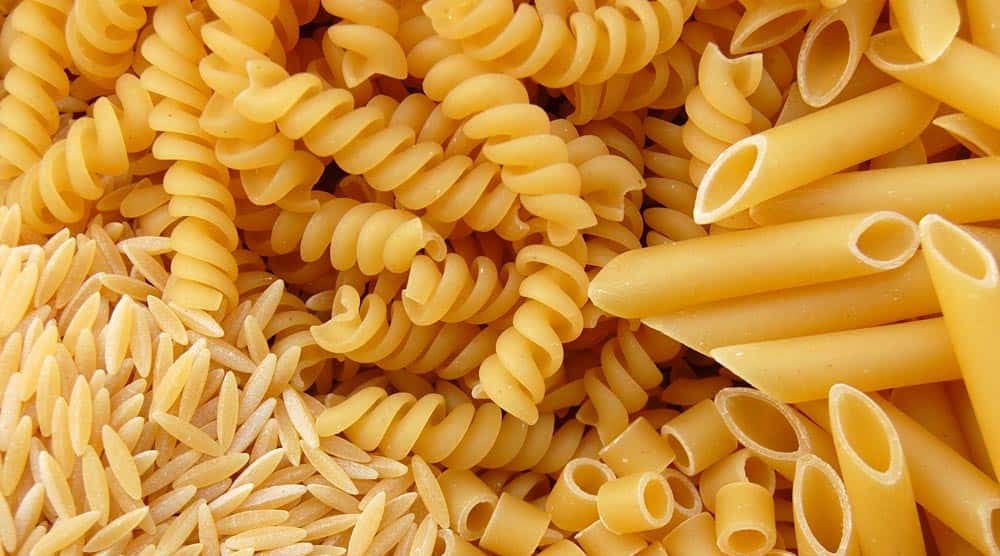Shop bought mushrooms are low-calorie and packed with vitamins and minerals. But can your dog eat cooked mushrooms? And what are the risks if they eat raw or wild mushrooms? Keeping reading for more information.
Plain and cooked mushrooms bought from a store will likely be safe for your dog to eat in small quantities. They’re high in fiber, low in cholesterol and fat, and contain beneficial nutrients.
However, mushrooms aren’t a necessary food source for your dog, and are often cooked in seasonings or dressings that could be unhealthy. Also, steer clear of raw mushrooms, as these can be difficult for your dog to digest.
Wild mushrooms are a different matter, as some species are highly toxic. You should take your dog to the vet immediately if you see your dog eat a wild mushroom. If possible, bring a sample of the mushroom for identification.
Contents
Are Store-Bought Cooked Mushrooms Safe for Dogs?

Mushrooms bought from a grocery store, such as portobello, shiitake and button mushrooms, are generally safe for your dog to eat.
Not all dogs enjoy eating mushrooms, due to their slimy texture and unusual taste, and they certainly aren’t a necessary part of a canine diet. But you don’t need to worry if your dog snatches a plain, cooked mushroom from the counter or floor.
If your dog is partial to a cooked mushroom, it’s best to slice it up before letting them eat it. Gulping down a whole one could present a choking hazard, particularly for small dogs.
Mushrooms that have been cooked in sauce or seasoning could be dangerous though.
Onion or garlic, for example, are both toxic to dogs. Creamy sauces could also cause an upset stomach. Many dogs are lactose intolerant, so they can’t properly digest dairy products. Eating a large quantity of high-fat dairy or butter could even lead to serious gastric conditions like pancreatitis.
“Thankfully dogs need to consume at least 5g/kg of either garlic or onion before we see toxicity, which is unlikely from seasoned mushrooms,” says vet Dr Linda Simon. “Still, I always ask owners to check in with me to confirm treatment would not be needed.”
Do They Provide Any Health Benefits?
Mushrooms aren’t an essential food for dogs, and there isn’t any reason to add them as a regular part of your pet’s diet. If you’re looking for a healthy treat, there are better options that are easier to digest (and tastier for dogs!)
Cooked mushrooms do contain a variety of nutrients though. The benefits will vary, depending on the type of mushroom selected, but can include:
- Rich in selenium. Mushrooms contain lots of antioxidants. They’re particularly high in selenium, and this can help boost your dog’s immune system and promote healthy joints, skin and coat.
- High in Beta Glucan. Mushrooms are especially high in the soluble fiber Beta Glucan. Studies have indicated that this can be valuable to dogs in terms of cancer prevention and boosting the immune system.
- Packed with B Vitamins. Mushrooms are especially high in Riboflavin (vitamin B2). This can help promote skin and eye health and regulate cellular metabolism in dogs.
- Rich in potassium. Ensuring your dog gets plenty of potassium in their diet can help them maintain a healthy blood pressure.
If you decide to offer your dog mushrooms, you should introduce them slowly to allow the stomach time to get used to a new food group. As with any new food, it also gives you the opportunity to make sure your dog isn’t going to be allergic. Keep an eye out for itchy, irritated skin or gastric issues, as these can be symptoms of an allergic flare-up.
Another reason you may want to avoid giving your dog mushrooms is that it could make them more likely to seek wild mushrooms. This could prove to be a serious issue if you live in an area where toxic wild mushrooms are prolific.
What About Raw Mushrooms?
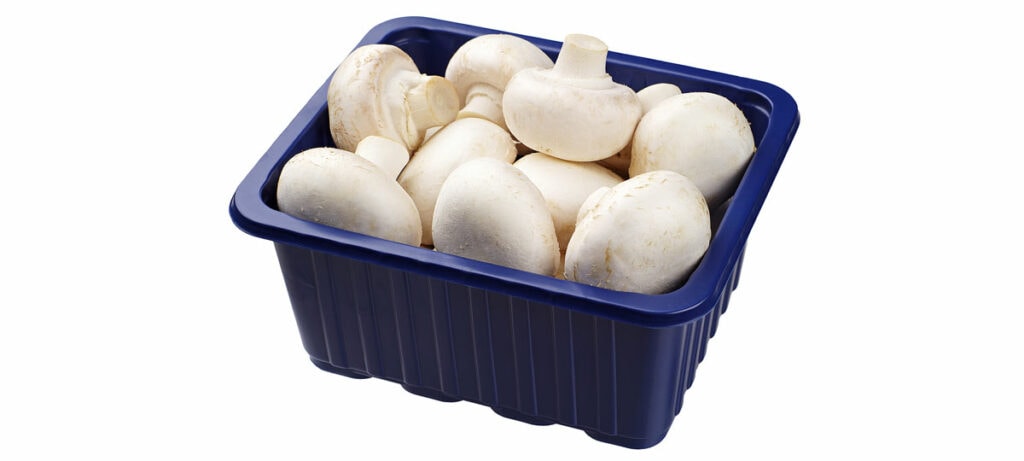
While cooked store-bought mushrooms are usually safe, dogs shouldn’t eat raw mushrooms.
Raw mushrooms contain a high quantity of insoluble fibers, particularly chitin, which are difficult for the body to digest Cooking breaks these substances down, but eating raw mushrooms could give your dog an upset stomach.
What About Wild Mushrooms?
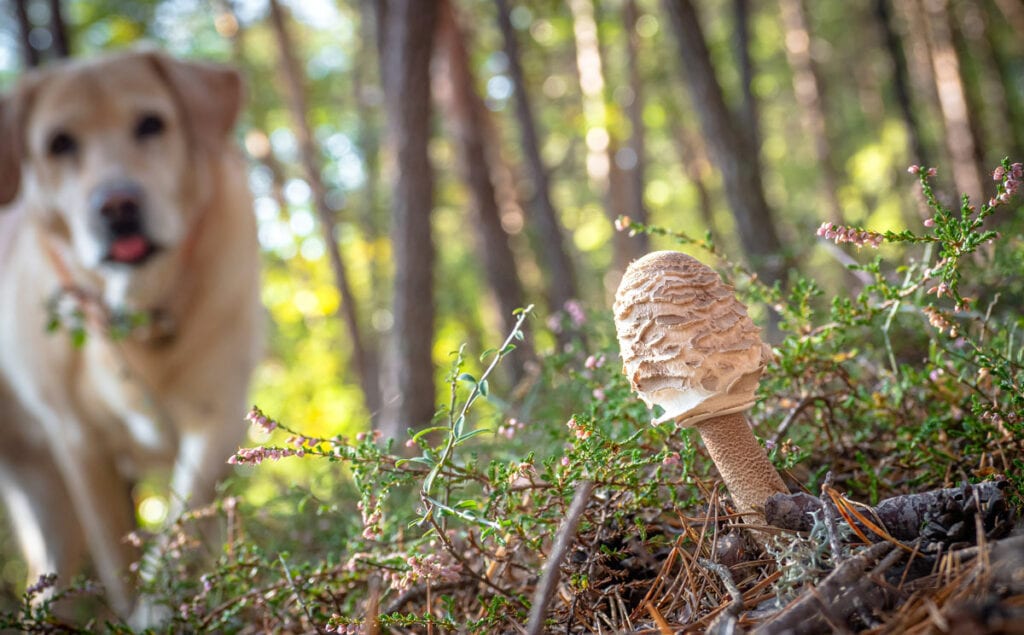
There are thousands of types of mushrooms, and less than one hundred are poisonous. The ones that are, however, can be highly toxic. Ingestion can lead to gastrointestinal problems, liver failure, neurological damage, seizures, and death.
Consequently, you should never feed your dog wild mushrooms. If you have a dog that scavenges, and you find yourself in an area with lots of fungi present, it’s always better to keep them on the leash.
If your dog does eat a wild mushroom, seek advice from your vet immediately. Ingestion of a toxic species is a medical emergency and speedy treatment can increase the chances of a good recovery.
Some people claim that dogs can tell the difference between a safe and a toxic mushroom by their scent. While dogs could potentially be trained to identify particular scents, it’s a myth that they’ll instinctively avoid eating poisonous types.
If your dog eats a wild mushroom, it’s best to assume it’s poisonous rather than trying to identify it yourself. Even mushroom experts struggle to accurately identify the various species. Seek urgent veterinary advice and, if possible, take a sample of the mushroom to make identification and subsequent treatment easier.
“It is not uncommon for owners to ring me in a panic after their dog has eaten a wild mushroom,” says Dr Linda Simon. “Most vets aren’t trained to know the difference between toxic and non-toxic wild mushrooms, so we often induce vomiting to reduce the risk of toxicity. This is especially true as there is no test to tell us if a poisonous mushroom was eaten.”
If you have potentially poisonous mushrooms growing in the garden, you’ll need to be proactive about removing them or cutting off your dog’s access to them.
Symptoms of Wild Mushroom Poisoning
The symptoms, severity, and reaction time of wild mushroom poisoning can vary depending on the species that’s been ingested. Some of the most common symptoms of mushroom poisoning include:
- Vomiting
- Diarrhea
- Gastrointestinal discomfort
- Seizures
- Shaking
- Disorientation
- Lethargy
- Profuse salivation
Summary
If your dog eats a cooked, plain mushroom, there’s probably nothing to worry about. Just watch out that any seasoning or sauces don’t contain dangerous ingredients for dogs, such as garlic, onion, or even dairy products. You also shouldn’t give your dog raw mushrooms, as they are difficult to digest.
Wild mushrooms should be avoided at all costs. Although many species are safe, there are highly toxic varieties that can cause serious symptoms or even death. If your dog eats a wild mushroom, it’s vital to seek urgent advice from your vet.
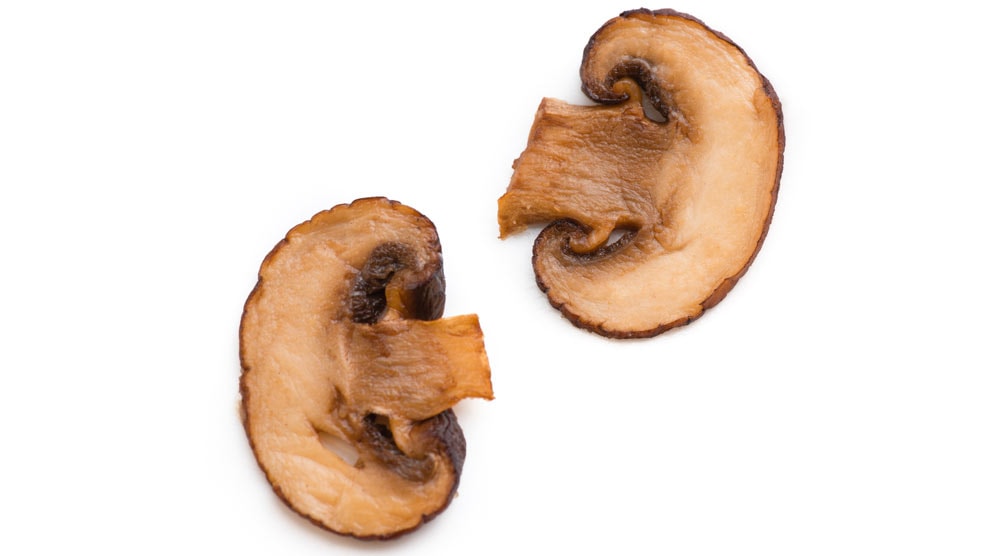

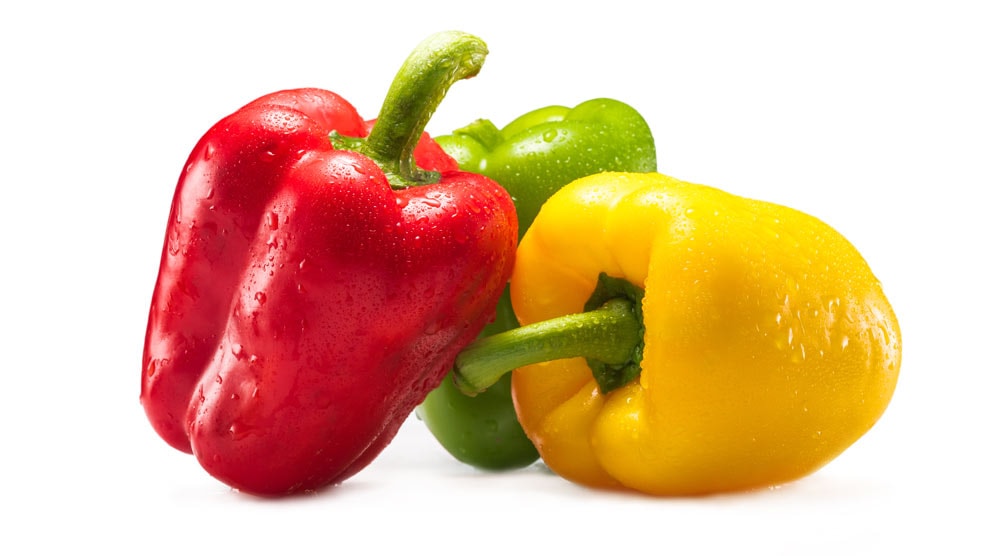
![Can Dogs Eat Starburst? [Quick Answer]](https://www.thedogclinic.com/wp-content/uploads/2022/09/featured-image-can-dogs-eat-starburst-1.jpg)
